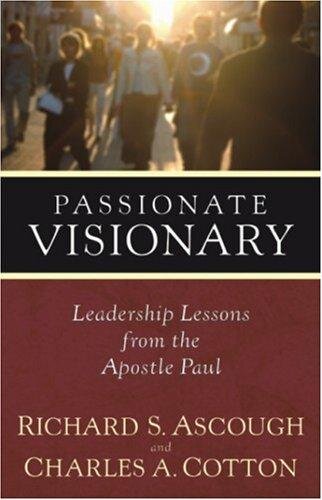Richard S. Ascough and Charles A. Cotton, Passionate Visionary: Leadership Lessons from the Apostle Paul. Hendrickson, 2006.
Referenced in:
LifeandLeadership.com Summary
Aside from being an excellent source for pastoral thelology, this is one of a growing number of texts on Leadership and the New Science. I recommend it as an advanced level read after one has become familiar with the theory, using the other resources suggested in the Ministry Resource Guide on the subject.
Passionate Visionary is a collaboration of two professors, one in New Testament and the other in business. The book can be read in two ways. The first is probably for leadership geeks, to start at the conclusion which ties the gist of the previous chapters to designating Paul as an example of chaordic leadership. From there, go back to each of the four sections to see how they develop this. The second would be to read the book from the start, and then get to the conclusion. I did the former, and was fascinated.
The authors divide the book into sixteen chapters organized around four leadership themes from Paul. Each chapter focuses on a specific New Testament passage. A main lesson is tied to each passage, and each of these lessons are summarized at the end in contemporary leadership lingo as “Pauline Maxims for Modern Leaders.”
Part I: Paul, the Passionate Visionary
- Paradigm Busting, Galatians 1:13-24 – Maxim: If you are not busting paradigms, you are managing the past rather than creating the future.
- Sharing the Vision, Romans 15:22-29- Maxim: If you aren’t passionate about your vision, don’t be surprised by the apathy around you.
- Creating Shared Space, Philippians 2:2-4 – Maxim: If folks don’t get it the first time, keep the conversation going…eventually your words will connect.
- Driving Forward Through Adversity, 2 Corinthians 11:16-28 – Maxim: Leading people on sunny days is a breeze, but when the hurricane strikes, leaders stay the course.
Part II: Inspirational Links with Others
- Centrality of Relationships, Romans 14:1-2, 13-23, 15:1-2 – Maxim: Relationships are either authentic or abusive, and folks will always know the difference.
- Encouraging Followers, Philippians 1:3-11 – Maxim: If you aren’t encouraging them, you will eventually start to discourage them.
- Personal Transparency, 1 Corinthians 1:23-2:4 – Maxim: If you won’t open your heart, they will eventually close their ears.
- Networking and Staying in Touch, Romans 16:1-6 – Maxim: Forget them, and they will forget you.
Part III: Nurturing Community
- Shared Leadership and Team Ethos, 1 Corinthians 16:5-12 – Maxim: It helps to have a few friends on lonely roads.
- Community Building and Norms, 1 Thessalonians 4:9-12 – Maxim: Community is the way to live, but everyone has to share ownership.
- Clarifying Boundaries, Galatians 5:13-15 – Maxim: Lines aren’t always straight and narrow, but even a few wavy lines sure come in handy.
- Abrasive Encounters, Galatians 3:1-4 – Maxim: Sometimes tough talk is the only way forward.
Part IV: Compassionate Concern
- Celebrating Diversity, 1 Corinthians 12:12-31 – Maxim: Celebrate the fact that they are different from you…thank God!
- Advocating for Others, Philemon 10-18 – Maxim: Even in jail, stand up for the weak ones unless you want to end up standing alone.
- Giving Up Control, 1 Corinthians 3:3-15 – Maxim: If you won’t let go, they will never grow.
- Compassion as the Bottom Line, 1 Corinthians 13:1-13 – Maxim: If you stop loving them, they will start leaving you.
The conclusion to the book is an essay on “Paul the Chaordic Leader,” where the authors “synthesize our message by linking Paul’s leadership to recent studies in organization behavior that apply chaos theory to leadership. Paul embodies much of what is being touted by some as an ideal approach to transformational leadership.” (152) They first describe chaos theory and then show how Paul fits the theory.
From the Publisher
The Apostle Paul was a transformational genius. Indeed, the details of his life and ministry offer remarkable insights for modern leaders. Yet the curious and consistent omission among many biographies, testimonials and training manuals on leadership is the apostle who laid the foundation for the Christian Church as we know it. He took a new and struggling faith out into the world and built and sustained a fragile network by coaching, cajoling, and inspiring hesitant followers. Almost two thousand years later the heritage of the churches he founded continues in the faith communities of the Christian tradition. Now a seasoned Bible scholar and an expert in organizational leadership and change offer principles for modern managers and leaders drawn from Paul’s dynamic leadership style. In a unique blend of management theory and biblical scholarship, Ascough and Cotton demonstrate that Paul essentially wrote the book on how transformational leaders should operate. Thoroughly grounded in biblical studies and the academic study of leadership—yet written in a clear and readable style—their conclusions will challenge thinking in a variety of organizations. Features:
- Sets individual biblical texts in their socio-cultural setting before demonstrating how they address contemporary leadership challenges.
- Offers questions for reflection and discussion that will help stimulate creative thinking about leadership in churches and other settings.
About the Authors
Richard S. Ascough is Associate Professor of New Testament at Queen’s Theological College, Kingston, Ontario. He is the author of Miracles of Jesus.
Charles A. (Sandy) Cotton is an internationally acclaimed expert in leadership. He was chair of Programs for Management, Queen’s University, and the first director of its Institute for Faith and Ethics in Society.
***For additional information on this resource, including reviews, click the bookstore links. Check the reference at page top or the links below for resource guides on related topics.***
Related Areas
See Other Resources on Leadership and the New Science:
See Other Resources on Leadership:
See Resources on Over 100 Ministry Topics:


